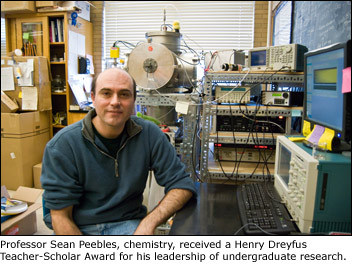Award Provides Funding, Validation for EIU Undergrad Research
Dec-18-2009  Although Sean Peebles is appreciative of the funding he's receiving, he and his colleagues are equally excited about the honor his recent award represents.
Although Sean Peebles is appreciative of the funding he's receiving, he and his colleagues are equally excited about the honor his recent award represents.
The Eastern Illinois University chemistry professor was named one of seven individuals nationwide to receive a Henry Dreyfus Teacher-Scholar Award for 2009. The award provides a five-year $60,000 unrestricted research grant to each recipient.
Both Peebles and Mark McGuire, professor and interim chemistry chair at EIU, said that while it is gratifying to be awarded this generous funding for the proposed research, the source of the grant -- the nationally and internationally known Camille and Henry Dreyfus Foundation Inc. -- greatly adds to the value of the award.
According to its Web site, the foundation was established to advance the science of chemistry, chemical engineering and related sciences as a means of improving human relations and circumstances.
Founded in 1946 by chemist, inventor and businessman Camille Dreyfus as a memorial to his brother Henry, the foundation became a memorial to both men when Camille Dreyfus died in 1956. Throughout its history, the foundation has sought to take the lead in identifying and addressing needs and opportunities in the chemical sciences. Since its founding, it has contributed well more than $100 million to support chemistry, chemical engineering and related fields.
"This certainly is a great honor for Sean, but also for the chemistry department and Eastern Illinois University as we, as an institution, seek to be a real leader in undergraduate research and education," McGuire said. "We're being recognized as a university that promotes quality student research at the undergraduate level. We are not just keeping our students occupied with 'busy work.'"
McGuire, whose office sits next to Peebles', nominated his colleague for the Dreyfus Award based on what he had observed since Peebles came to Eastern in 2001. In addition to what he has seen as exemplary interaction between Peebles and his students, McGuire also saw dedication, ingenuity and passion when it came to research.
The technical description of Peebles' research reads as follows: "Microwave spectroscopic studies of transition metal complexes prepared by laser ablation." In layman's terms, Peebles and his students will attempt to learn more about fuel chemistry by using a laser to produce metal atoms and then study their chemical reactions with simple petroleum by-products.
At this very early stage in the research, Peebles acknowledged, it is difficult to tie in the importance of the findings with specific implications for the general public. Instead, the research findings will provide improved understanding of chemical reactions that have importance in a wide range of related disciplines, including the pharmaceutical and petroleum industries.
Peebles enjoys this research, and doesn't mind sharing his opportunities with his students as their teacher and mentor.
"I enjoy interacting with students, whether they be enrolled in General Chemistry Lab I or a graduate course," he said. "And I try to be available for them when they need me."
This goes for the entering freshman who may not have adjusted to university life or the more introverted student who, Peebles says, reminds him of himself at that early age.
But he also enjoys mentoring those more advanced students who commit to research and follow it up with written reports, many of which are then published. Some students, Peebles added, even travel to national and international conferences where they are given the opportunity to present their research before other students and student-friendly faculty and scientists.
"They're immensely proud of their accomplishment, but very nervous, as well," he said.
With the help of his Dreyfus award, Peebles hopes even more students get the opportunity to share research findings. While about half the grant ($33,000) is designated for equipment and supplies, more than $20,000 will be used for stipends for students conducting research and to fund student travel to conferences to present their results. The remaining portion of the grant -- $5,000 -- goes toward departmental expenses associated with research and education.